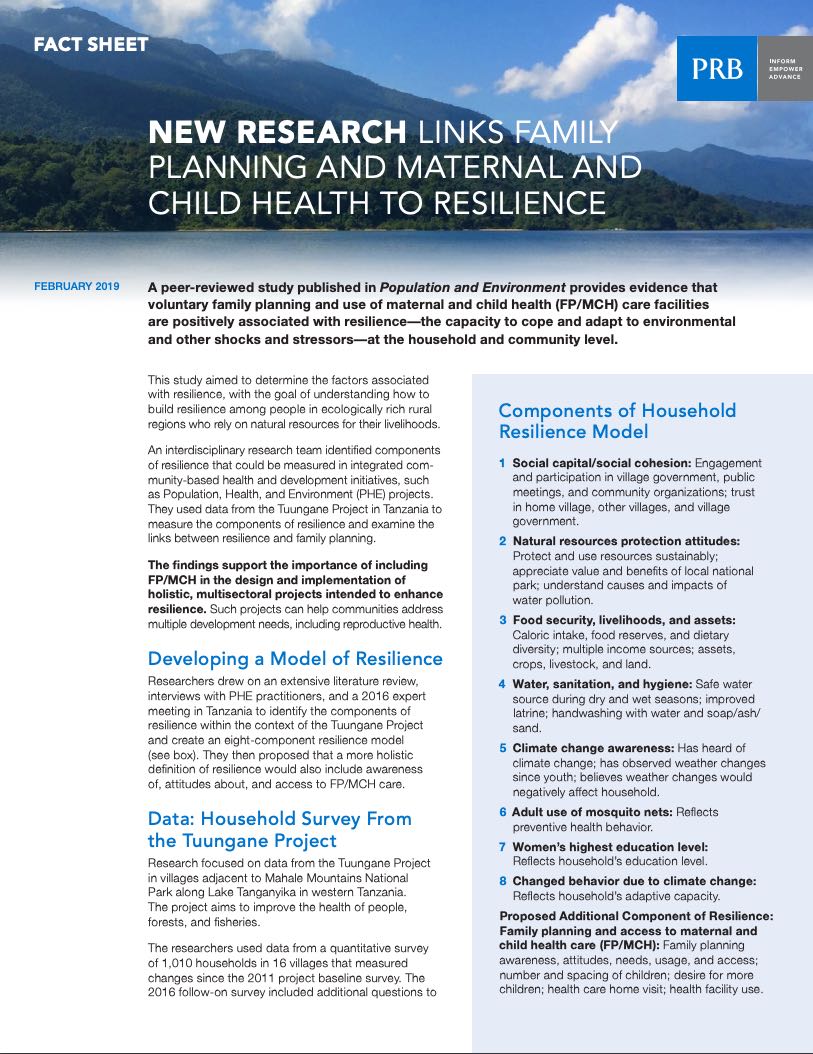
New Research Reveals Family Planning Is Associated With Enhanced Resilience
Date
December 11, 2018
Authors
Karen Hardee
Hardee Associates
Kristen P. Patterson
Former Program Director
Anika Schenk-Fontaine
Leibniz Institution for Educational Trajectories
Sebastiaan Hess
Hess Environmental Economic Analyst
Craig Leisher
The Nature Conservancy
Clive Mutunga
United States Agency for International Development
Cheryl Margoluis
Pathfinder International
Cara Honzak
Pathfinder International
New research indicates that family planning and use of maternal and child health facilities is positively associated with resilience. Resilience has a range of definitions and operates at different scales. It is generally understood as the ability of an individual, household, community, or system to cope with shocks by responding in ways that maintain their essential functions while expanding their capacity to adapt to change.
In the December 2018 Population and Environment article, “Family Planning and Resilience: Associations Found in a Population, Health, and Environment (PHE) Project in Western Tanzania,” authors Karen Hardee, Kristen P. Patterson, Anika Schenk-Fontaine, Sebastiaan Hess, Craig Leisher, Clive Mutunga, Cheryl Margoluis, and Cara Honzak identify components of resilience that could be measured in PHE and other integrated development projects, and use data from the Tuungane Project in western Tanzania to measure resilience and better understand the links between resilience and family planning. This innovative analysis aims to determine which factors are associated with resilience in the project area, with the goal of understanding how to build resilience among people in ecologically rich rural regions who largely rely on natural resources for their livelihoods.
Currently, the main links between resilience, family planning, and improved reproductive health care are the impact of spacing and planning births on the health of mothers and children, and a possible association between fertility and environmental change. Existing frameworks have largely ignored the role of population dynamics and the potential for family planning and better reproductive health care to contribute to resilience. In this new study, the authors’ analysis finds that the association between family planning and maternal and child health, and resilience is robust across a range of factors and broadly related to the construct of resilience. Their analysis supports the importance of including family planning and maternal and child health in the design and implementation of holistic, multisectoral projects to enhance resilience. Such projects can help communities meet multiple development needs―including reproductive health―and cope with climate and environmental shocks.
Acknowledgments
This study and article were a collaborative effort among several institutions and individuals. Funding for the paper came from the Evidence Project and the Tuungane Project.
The contents of the manuscript are the sole responsibility of the Evidence Project (Population Council and Population Reference Bureau) and the Tuungane Project (The Nature Conservancy and Pathfinder International) and do not necessarily reflect the views of USAID or the United States Government.

 ">
">